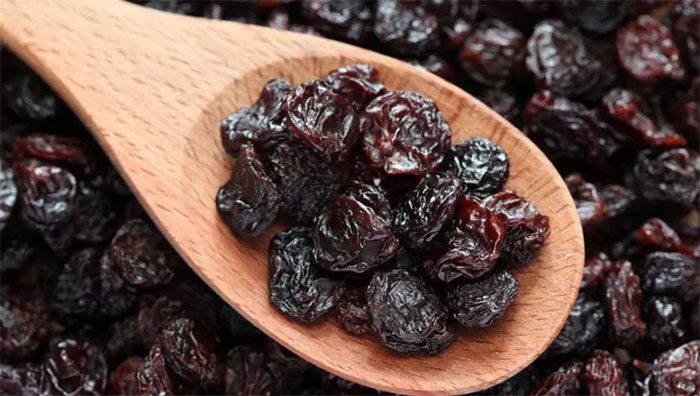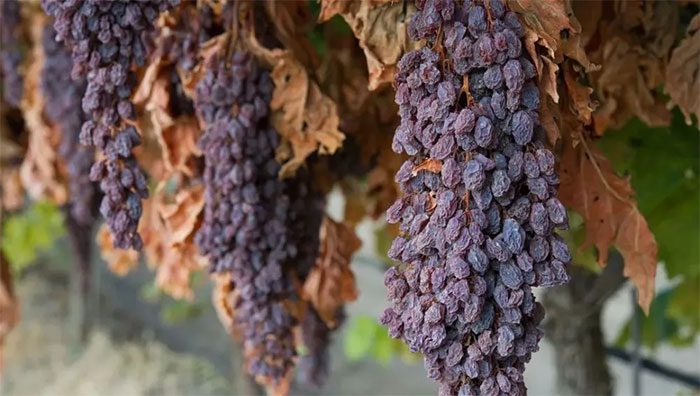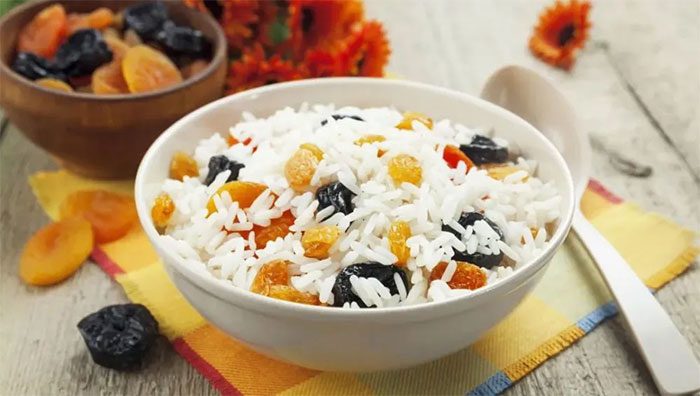Raisins are indeed high in sugar content, but they are also a food with remarkable nutritional value. When consumed correctly, they can even help lower blood pressure, blood fats, aid weight loss, and prevent diabetes.
Raisins are dried fruits made from fresh grapes, processed through dehydration methods such as sun-drying and air-drying without the addition of sugar and salt. Although some Vitamin C and antioxidants are lost in the process, the fiber, minerals, and many antioxidants remain intact, often in more concentrated forms than in fresh fruit.
Nutrients Found in Raisins
1. High in Potassium
100 grams of raisins contain more than 7-40 mg of potassium. According to international nutritional guidelines, the reference potassium intake for adults is 2000 mg/day. Consuming 25 grams of raisins can provide about 185 mg of potassium, which is approximately 9% of the recommended intake.
2. High in Fiber
The fiber content in 100 grams of raisins is about 3.3-4.5 grams, which is 5-9 times higher than that of polished white flour. Fiber not only enhances gut health and alleviates constipation but also helps with weight management (increasing satiety and delaying hunger), blood sugar control, and reducing blood fats.
Furthermore, during the production of raisins, some sucrose and fructose may form fructooligosaccharides during the drying process, with levels reaching up to 8%. Fructooligosaccharides act as a prebiotic, serving as “food” for gut probiotics and promoting gut health.

Fiber content in 100g of raisins is about 3.3-4.5 grams.
3. Rich in Antioxidants
There are more antioxidants in grape skins than in the flesh. Eating raisins, which includes the skins, is much richer in antioxidants than fresh grapes.
According to the Oxygen Radical Absorbance Capacity (ORAC – a measure of the antioxidant capacity of foods in vitro) data from the United States Department of Agriculture (USDA), raisins (1510), fresh broccoli (1548), fresh grapes (3049), and whole apples (3406) exhibit superior antioxidant capabilities.
The antioxidant capacity of foods correlates positively with their total phenolic content. The antioxidants in raisins primarily consist of polyphenolic compounds (caffeic acid and tartaric acid) and flavonols (quercetin, kaempferol, and rutin), along with anthocyanins. Like fiber, they also contribute to digestive health.
Studies have identified the total phenolic content of various foods, revealing that raisins have the highest total phenolic content compared to fresh grapes, dried plums, dried apricots, fresh peppers, and cherries.
Sweet but Blood Sugar Friendly with Many Health Benefits
Of course, besides the minerals, antioxidants, and concentrated sugars in raisins…
The carbohydrate content in 100 grams of raisins is around 80 grams, with sugars at approximately 65 grams, glucose at about 47%, and fructose at 53%. However, the glycemic index of raisins is not as high as many people think.
1. Safe for Diabetics and Helps Prevent Diabetes
Evaluations from various countries indicate that the glycemic index (GI) of raisins falls within the medium to low range, typically between 49 and 66. A GI of ≤ 55 is considered low; products with a GI from 56 – 69 are classified as medium; and GI ≥ 70 is deemed high.
This characteristic allows raisins to help lower blood sugar levels and insulin responses, even in diabetic patients. A 12-week study demonstrated that blood sugar levels after meals and fasting were lower in participants consuming dark raisins (approximately 90 kcal per 28g serving) compared to diabetic patients eating processed snacks like cookies (100 kcal per serving) before three meals, with post-meal blood sugar levels reduced by 23% and fasting blood sugar levels lowered by 19%.
Additionally, raisins have a low to medium glycemic index and are high in fiber, which is very beneficial in preventing type 2 diabetes. Research indicates that consuming certain whole fruits, especially blueberries, grapes, and raisins, is significantly associated with a lower risk of developing type 2 diabetes. Eating grapes and raisins is linked to a 19% lower risk of type 2 diabetes compared to drinking fruit juice three times a week.

The glycemic index of raisins is not as high as many people think.
2. Blood Pressure Control
One study found that consuming ≥4 servings (1 serving = 40–50g) of raisins weekly is associated with a lower risk of hypertension. Another study involving pre-hypertensive patients showed that after 12 weeks of dietary intervention, those who consumed 84g of raisins daily experienced a reduction in systolic blood pressure by 6.0-10.2 mmHg, a decrease of 4.8%-7.2%, and a reduction in diastolic blood pressure by 2.6-5.0 mmHg, a decrease of 2.5%-6.4%, compared to those who consumed cookie snacks.
Researchers believe that raisins increase dietary fiber and potassium, which may help lower blood pressure. Additionally, the antioxidant polyphenols may promote nitric oxide release and aid in lowering blood pressure.
3. Reducing Blood Fats
Consuming raisins seems to help lower total cholesterol, LDL cholesterol, and some biomarkers of inflammation. The phytochemicals in raisins, particularly phenolic compounds, offer protection against atherosclerosis due to their strong antioxidant properties.
Eating 160g of raisins daily, regardless of whether walking increased simultaneously, led to decreases in total cholesterol and low-density lipoprotein cholesterol.
Healthy but overweight individuals, when on a low flavonoid diet, may moderately improve serum antioxidant capacity by consuming 90g of seedless raisins daily for 14 consecutive days.

Consuming raisins in moderation can help reduce overall energy intake.
4. Weight Management
Although raisins are relatively high in calories and contain over 50% sugar, consuming them in moderation can help reduce overall energy intake and curb appetite.
This is also due to the fiber and nutrients in raisins, which are essential for promoting bodily functions and metabolic processes.
5. Good for Oral Health
Studies have found that eating raisins alone does not lower the mouth’s pH below 5.5; they do not linger on teeth for too long, and raisins contain antioxidants with antibacterial activity that can inhibit the growth of oral bacteria associated with dental diseases. This means that eating raisins may also benefit your oral health.
How Much Raisins Should You Eat?
Based on consumption amounts in various studies, if you consume approximately 200-300g of fruit daily, then 20g per day is more appropriate, satisfying cravings while also providing numerous health benefits.
If you do not consume 200-300g of fruit daily, you can eat 30-40g of raisins.


















































